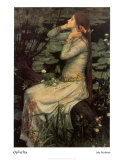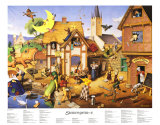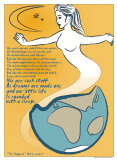It’s strange, because in many ways, Shakespeare’s plays are very much a product of their era, but, at the same time, they are a product of almost any era. Even Shakespeare’s portrayal of Elizabethan and Jacobean outsiders - Shylock in The Merchant of Venice, Othello in Othello and the women of every single one of his plays - are handled in a way that does not mark the plays out as archaic in their views.
Despite being the ‘weaker’ sex, Shakespeare’s gals are feisty, strong and, in most cases, disobedient of the social conventions that are designed to dictate their ‘place’ in society. By the same token, Shylock, although a Jew in a very anti-Semitic era, can be seen as an incredibly sympathetic character. The same, of course, can be said for Othello and, arguably, the other black characters of Shakespeare’s plays - Morocco in The Merchant of Venice is not judged on the color of his skin and even Aaron, from Titus Andronicus, is redeemed.
So, regardless of the vast changes that have occurred over the last four hundred years, Shakespeare’s representation of human beings, on the whole, doesn’t jar too significantly with our modern perceptions and sensibilities.
There are, of course, occasions when Shakespeare’s plays are satirical and particularly prevalent to the world at the time of their writing. But, by and large, Shakespeare’s work examines what it is to be human:
- Lust
- Ambition
- Power
- Infidelity
- War
- Faith
- Unrequited love
- Familial relationships
- Marriage
- Romantic love
- Sex
- Friendship
- Loyalty
- Betrayal
- Madness
- Deception
- Revenge
- Jealousy
Quite frankly, the list could go on and on. But what you quickly notice is that these facets of the human condition are just as relevant to us, as they were to the Elizabethans, and as relevant as they would have been to the Ancient Romans, or prehistoric man. We homo sapiens may have come a long way in 200,000 years, but the things that make us…well, us, have changed very little. And this is why Shakespeare's plays are so readily and easily shifted to any time period and location.














 How to Avoid College Debton 07/31/2014
How to Avoid College Debton 07/31/2014
 Was Charlotte Bronte Jealous of her Sister Anne?on 07/15/2014
Was Charlotte Bronte Jealous of her Sister Anne?on 07/15/2014
 Whose Side is Cancer Research UK on?on 07/06/2014
Whose Side is Cancer Research UK on?on 07/06/2014
 A Plot Summary of Electra by Sophocleson 07/05/2014
A Plot Summary of Electra by Sophocleson 07/05/2014



Comments